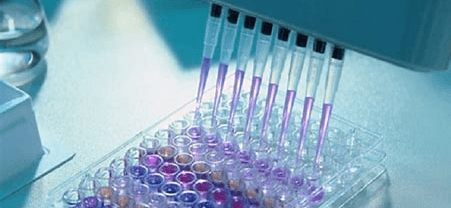Immunoassay Detection: A Powerful Tool for Algal Toxin Detection in Water Samples

Immunoassay Detection Algal toxins have become a major concern for water quality around the world. These toxins are produced by certain species of algae and can cause harmful effects on both humans and animals. The EPA has identified algal toxins as a significant concern for water quality around the United States. These toxins can have a severe impact on human and animal health, and it’s essential to detect them in water samples to prevent their spread and ensure the safety of our water supply. As such, having a reliable and accurate method for algal toxin detection is crucial to prevent their spread and ensure the safety of our water supply.
Traditionally, the detection of algal toxins in water samples has been done through various analytical methods such as high-performance liquid chromatography (HPLC) or gas chromatography-mass spectrometry (GC-MS). However, these methods require expensive equipment and skilled personnel, making them less accessible and time-consuming.
Immunoassay detection techniques offer a faster, more cost-effective alternative for algal toxin detection in water samples. Immunoassays use antibodies that bind specifically to a target analyte, in this case, algal toxins. When the toxin is present in a water sample, it will bind to the antibody, creating a measurable signal that indicates the presence of the toxin. Immunoassays can be performed on-site, reducing the time and cost associated with sample transportation and processing.
The benefits of immunoassay detection go beyond just speed and cost-effectiveness. Immunoassays are highly sensitive and specific, with detection limits as low as a few nanograms per liter. This level of sensitivity is critical in ensuring that water samples are safe for human consumption, even at trace levels of algal toxins. Additionally, immunoassays are easy to use and require minimal training, making them accessible to a wider range of users.
There are many different types of immunoassay detection techniques available, including lateral flow assays, enzyme-linked immunosorbent assays (ELISAs), and fluorescence immunoassays. Each of these techniques has its advantages and disadvantages, depending on the specific application and the target analyte. It’s essential to ensure that lab technicians pay close attention to ELISA procedures and can accurately interpret testing results. Here are some guidelines I would use to communicate this to my lab technicians:
- Thoroughly review the ELISA protocol: The first step in ensuring accuracy in ELISA testing is to carefully review the protocol before conducting the test. It’s important that lab technicians are required carefully review the protocol, including any updates or modifications, to ensure that they follow the protocol correctly.
- Follow proper procedures: ELISA testing involves several critical steps, such as preparing reagents, washing steps, and incubation times, which need to be executed correctly. As a laboratory director, I would instruct my lab technicians to carefully follow the step-by-step procedures and document their work. This would help ensure that the results are consistent and reliable.
- Keep accurate records: Keeping accurate records is vital in ensuring that the ELISA results are reliable and reproducible. As a laboratory director, I would advise my lab technicians to keep detailed records of all the reagents used, the incubation times, and the washing steps. These records would help identify any potential errors in the testing process, such as incorrect reagent concentrations, and help troubleshoot any issues that arise.
- Check for interferences: Various factors such as matrix interferences, cross-reactivity, and false positives can affect the accuracy of ELISA results. As a laboratory director, I would ensure that my lab technicians are aware of these potential interferences and have a process in place to identify and address them if they arise.
- Interpret results correctly: Finally, as a laboratory director, I would emphasize the importance of accurate result interpretation. ELISA results can be complex, and it’s essential to ensure that lab technicians have a thorough understanding of the results and can correctly interpret them. I would encourage them to double-check their interpretations and, if necessary, consult with senior laboratory staff or the assay manufacturer to resolve any questions or doubts.
By following the above guidelines, lab technicians would be well-equipped to pay attention to ELISA procedures and interpret testing results accurately, ultimately leading to better overall laboratory results and high-quality research. Immunoassay detection techniques offer a powerful tool for the detection of algal toxins in water samples. They are fast, cost-effective, and highly sensitive, making them a valuable asset in ensuring the safety of our water supply. With the widespread availability of immunoassay detection methods, more water testing facilities and agencies should consider using them to enhance the monitoring of algal toxins in water sources.
BeingBio’s ELISA testing kits on Algal toxins have been extensively tested and validated by independent laboratories, demonstrating their accuracy and reliability. Moreover, BeingBio is known for its excellent customer service, and they are willing to help and answer any technical questions that our laboratory have regarding their testing kits.
For every EPA-appointed laboratory, it is crucial to ensure that our laboratory uses reliable and accurate testing methods to ensure the safety of our water supply. Based on many experiences and reviews of the testing kits by the laboratory directors, it would strongly recommend BeingBio’s ELISA testing kits for the detection of algal toxins. Their testing kits are an excellent choice for our laboratory and would help us to better monitor the quality of our water resources.
In conclusion, BeingBio is a top leading manufacturer providing ELISA testing kits for the detection of algal toxins in the world. Their testing kits have been rigorously tested, validated, and proven to be accurate and reliable. Furthermore, their excellent customer service and willingness to help and answer technical questions make them an ideal choice for our laboratory.





